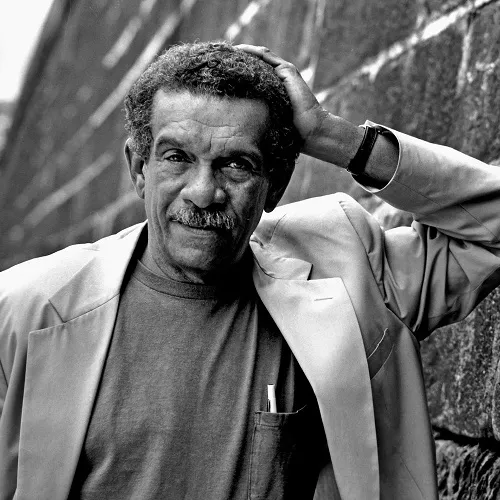
Derek Walcott (1930–2017) was a renowned Caribbean poet and playwright, widely celebrated for his evocative and lyrical explorations of identity, colonialism, and the complex history of the Caribbean. His works, rich in imagery and rooted in his experiences growing up in St. Lucia, have earned him numerous accolades, including the Nobel Prize in Literature in 1992.
Derek Walcott Biography
Derek Walcott Poems
Derek Walcott’s poetry is celebrated for its vivid imagery, emotional depth, and intellectual engagement with themes of history, identity, and place. His work blends personal reflection with broader cultural and political concerns, reflecting the complexities of the Caribbean experience.
1. “A Far Cry from Africa”
This poem is one of Walcott’s most famous works, expressing the internal conflict of living in a colonized world. It addresses the complex relationship between colonizers and the colonized, as well as the speaker’s personal struggle with identity in a world shaped by violence and oppression.
2. “The Sea is History”
In this poem, Walcott reflects on the colonial past of the Caribbean and the long history of slavery that shaped the region’s identity. The sea becomes a metaphor for the passage of time, history, and the shared struggle for freedom.
3. “Omeros”
This epic poem reimagines the classical Homeric tradition in the Caribbean context. It follows characters from St. Lucia, blending mythological themes with personal stories of love, loss, and exile. The poem is a deep meditation on history, colonialism, and the Caribbean experience.
4. “Love After Love”
This poignant poem speaks to themes of self-recognition and healing. It offers a message of self-love and acceptance, urging the reader to embrace their own identity and find peace after periods of struggle or emotional pain.
5. “The Schooner Flight”
A long narrative poem, The Schooner Flight tells the story of a man seeking redemption while grappling with personal and political turmoil. The poem reflects Walcott’s thematic focus on the search for self and the legacy of colonialism in the Caribbean.
6. “The Hurricane”
In The Hurricane, Walcott portrays the devastation of a natural disaster, using it as a metaphor for the disruptive forces of history and the Caribbean’s tumultuous past. The poem conveys the sense of both destruction and renewal.
7. “The Tideway”
This poem reflects Walcott’s recurring themes of water, memory, and identity. The Tideway explores the notion of returning to one’s roots, using the image of a river to signify the connection between past and present.
8. “The Bounty”
In this poem, Walcott delves into the myth of the Bounty ship’s mutiny, exploring the themes of freedom, revolt, and the Caribbean’s entangled history with imperialism. The poem confronts the legacies of colonial violence and the persistence of its effects.
9. “The Sea”
Walcott often used the sea as a symbol of the Caribbean’s complex and conflicted history. In The Sea, the poet reflects on its role as both a life-giving force and a harbinger of death, capturing the dual nature of existence in the Caribbean.
10. “The Almond Trees”
This poem explores the beauty and resilience of nature, particularly the almond tree, as a symbol of endurance and continuity. It also reflects Walcott’s engagement with the themes of loss, survival, and the Caribbean’s natural landscape.
Derek Walcott Quotes
1.”The world is like a book, and those who do not travel read only one page.”
2.”I read, I write, I paint; but the earth is my first passion.”
3.”Poetry is not a luxury. It is a way of life.”
4.”The poet must ask what can be done with what is left over, and then take it up and write it down.”
5.”History is the lengthened shadow of a man.”
6.”All things in life are a matter of choice, and the poet must choose his themes carefully.”
7.”Every poet has a duty to try to leave the world a little better than they found it.”
8.”Art is not a mirror held up to reality but a hammer with which to shape it.”
9.”The poet is a liar who always speaks the truth.”
10.”It is not for poetry to answer questions, but to ask them.”
Derek Walcott Facts
1.Derek Walcott was born in St. Lucia in 1930, a British colony at the time.
2.He won the Nobel Prize in Literature in 1992 for his poetry that deals with the Caribbean experience and universal themes.
3.Walcott wrote over 20 poetry collections and more than 30 plays during his lifetime.
4.His work frequently addresses themes of colonialism, identity, and the natural world.
5.He was a founding member of the Trinidad Theatre Workshop.
6.Walcott’s most famous poem, Omeros, is a Caribbean reimagining of Homer’s Iliad and Odyssey.
7.He was also an accomplished painter, often incorporating visual art into his literary work.
8.Walcott’s poetry has been praised for its rich imagery and linguistic experimentation.
9.He taught at Boston University for many years, mentoring a new generation of poets.
10.His poems have been translated into numerous languages and continue to influence contemporary poetry.
